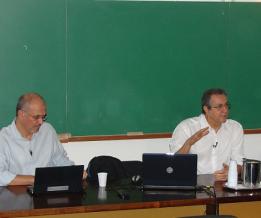scientific diffusion Seminars and Agenda Overcoming inequalities? Affirmative action based on color and school of origin: a balance
Overcoming inequalities? Affirmative action based on color and school of origin: a balance
"Overcoming inequalities? Affirmative action based on color and school of origin: a balance" Seminar, by professores Antonio Sérgio Guimarães e Renato Pedrosa.
POST-EVENT
The seminar series, promoted by CEM (Center for Metropolitan Studies), brought together Antonio Sérgio Guimarães (Department of Sociology, University of São Paulo) and Renato Pedrosa (Comvest, a permanent committee for admission, University of Campinas). The researchers discussed affirmative action at the tertiary educational level, under the theme “Suplantando desigualdades? Favorecimento por cor e por origem escolar: um balanço” (Overcoming inequalities? Affirmative action based on color and school of origin: a balance).
Antonio Sérgio Guimarães, a professor from the Sociology Department at USP, and Dr. Renato Pedrosa, from the Permanent Commission for Vestibular, UNICAMP, presented and discussed research results and evaluations of affirmative action in public universities in the seminar, “Overcoming inequalities? Affirmative action based on color and school of origin: a balance.” Director of the CEM, Marta Arretche, emphasized that the comparative research used by the USP researcher occupies a central role in the internal agenda of the institution.
Antonio Sérgio Guimarães presented the first round of results from a research at the Federal University of Bahia, relative to admission at the medical course. After the initial phase, the research will also include nursing and nutrition courses.
Affirmative Action at UNICAMP was the subject of the Renato Pedrosa’s presentation, and he covered the program’s origins, which adopted the system of Bonus**Benefit (to public school students).
He affirmed that the results of the program highlighted the importance of affirmative action for public universities, and emphasized that the inclusion at UNICAMP was careful to select academically qualified students, and now, the university has better students, thanks to affirmative action.




